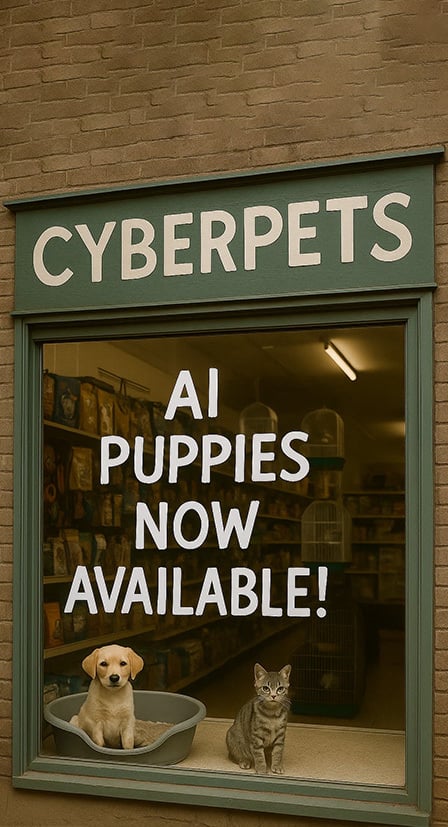An algorithm by any other name...
If there’s one thing in this world you can always count on, it’s the relentlessness of the marketing machine. If the tiniest modicum of consumer interest arises over a word, phrase, or concept, you can be certain, within mere days, it will be absolutely EVERYWHERE. In the 1950s and 60s it was terms like “Solid State” and “Hi-Fi,” both of which started with at least some basis in descriptiveness but soon became utterly meaningless. Later, terms like “Space Age,” “Turbo,” and “Lite” became the go-to buzzwords, only to be toppled by “All-Natural,” “Digital,” and “Nano.” And today?
Well, it’s “AI.”
And like most of those other terms, “AI,” (aka “Artificial Intelligence,”) started off with a definitional intent that’s gotten pretty lost—yes, in part due to the continuing evolution of the technology itself. But also because marketers are taking full advantage of the public’s deficit of understanding of AI to blast it out as a purchase signal: “Buy this because it has modern stuff in it.”
And while today’s consumer public is considerably more sophisticated and, let’s face it—jaded—than those in earlier times, there really is a complexity surrounding the topic of AI that makes it ripe for abuse as a term.

Roborabbit says, “Eat your AI Bits and get smarter! Artificially!”
Some terms are insidiously misused.
Don't just read. Understand.
The terms “All-Natural” and “Organic” have both been mainstays of the food and supplement industries for a few decades now. Meant to evoke images of some aging farmer rising with the sun, walking his rows of soft, green plants while sipping a steaming cup of coffee and harvesting his carefully cultivated crop grown only with light, water, and love, few have stopped to consider what these terms really mean. The USDA and FDA recognized “Organic” was being abused and stepped in to create at least some regulation around its use, but “all-natural?” It’s ill-defined, and there isn’t really any effective restriction around its use. Worth noting: lead, arsenic, and mercury are “all-natural.” So is manure. We don’t recommend sprinkling any of them on your breakfast cereal.
What does AI mean?
Artificial Intelligence as a concept goes much farther back than many realize. Ancient texts refer to beings made by gods or men, magically imbued with self-awareness and intelligence. Self awareness is quite a long way off, if it ever happens. But intelligence? The tech we create is getting more of it practically every day.
In today’s parlance, “AI” refers to computer-based or computer-driven systems that are capable of doing certain things that typically require human effort. Some of the most common of these are understanding language, identifying images and patterns, making decisions, and learning from data.
That’s along the lines of a textbook definition, of course. What AI actually means is a bit more complicated. And that’s where the confusion (as well as those who desperately want to cash in on it) come in.
Does “AI” always mean the same thing?
In short: definitely not. There are many different types of AI, each best suited to different tasks. That’s not to say there’s absolutely no crossover—there absolutely is. But think of the differences this way: A car, an RV, a pickup truck, a skateboard, and a bike are all TECHNICALLY ground transportation. But few would argue it’s best to take an RV to visit your grocery store. Or to use a bike to visit your relatives 5 states away. Or to use a compact sports car to haul drywall from the local builder store.
And if you use a skateboard for any of the above… you’re just weird. Seriously, what’s WITH you? But you see the point. Imagine arriving at the airport and meeting the representative from the company you hired for “airport transportation,” only to learn they arrived with roller skates. You’d be pretty upset (unless you grew up in the 80s, in which case you might dig it). You’ve been had on a technicality; roller skates are a form of transportation. But hardly the form you wanted (or expected).
All AI is designed to step in and do some reasonably complex “thinking.” Whether or not that particular way of going about it is best for the task at hand, however, is a question many of us don’t even know to ask. Enter the marketers.

He can sit, roll over, fetch the paper, and if you give him a
cookie—solve quadratic equations and book you the cheapest flight to Bora Bora.
Commonly used AI
Category
|
Examples |
Function |
|
Voice Assistants |
Alexa, Siri, Google Assistant, Bixby, Cortana |
Voice recognition, natural language understanding, smart home control, search, scheduling |
|
Conversational AI / Chatbots |
ChatGPT, Gemini (formerly Bard), Claude, Microsoft Copilot, Meta AI, Jasper |
Human-like conversation, content generation, code writing, task automation |
|
Content & Image Generation |
DALL-E, Midjourney, Stable Diffusion, Runway, Sora, Writesonic, Copy.ai |
Text-to-image generation, video editing, writing blogs, marketing copy, visual design |
|
Customer Support & Business AI |
Intercom, Zendesk AI, Drift, x.ai, Clara, Motion, Grammarly, Notion AI |
Chatbots, support automation, AI email assistants, grammar/style checking, summarizing notes |
|
Search & Recommendation |
Google Search (SGE), Netflix, YouTube, Spotify, Amazon |
Personalized recommendations, product suggestions, predictive search |
|
Smart Devices with AI |
Tesla Autopilot, Roomba, Nest Cam, Ring, Smart Thermostats (Nest) |
Self-driving, navigation, facial recognition, smart home automation |
|
AI in Everyday Apps |
Apple Photos, Google Photos, TikTok, Snapchat, Canva Magic Tools |
Photo tagging, content curation, filters, design suggestions, AI-powered writing |
Beware the hype
“Look! We added AI!" It’s the new “all-natural” of the tech world. It gets attention, but does it really MEAN anything? The truth lies in knowing a few facts about the AI in question:
-
Is the AI in your product designed specifically for the task you’re using it for? Or is it a licensed form of someone else’s commercial AI—great for your kid’s term paper or finding you the cheapest tickets to the Taylor Swift concert (you still can’t afford them, don’t bother)—but maybe not so great for your specific needs?
-
Is the AI primed to save you time where you need it saved? Or is it just a nifty bell/whistle like that touchscreen in your car?
-
Does the vendor have any control over the development of the AI? In other words, can they direct what kinds of updates and improvements you might see, or are they relying on some third party to do it? And when it is improved, is it with features or abilities relevant to you? Or does it just find you 17 more cat videos than before?
-
Is the AI addressing a core competency of the product, or is it being bolted on to take advantage of an undereducated market?
What can’t AI do?
Plenty. While new applications for existing AI are always turning up, and R&D is making AI more capable all the time, these systems remain far from human. That means it can be creative, but not without limits. It can recognize patterns and inputs, but might not know what to do about them outside of specific contexts. It can learn, but can’t necessarily apply its lessons to unrelated tasks, problems, or processes. It also can’t do that thing where it swallows a bunch of air and then forces a belch.
Face it folks, we’re just hard to replace.

Losing ground to electric cars, petroleum distillers turn to technology to
make fossil fuels more attractive.
Thanks for the info, but what am I supposed to do
with this?
In addition to good general knowledge, you can put what you’ve learned here into action. Before plunking down your company’s hard-earned profits into the next AI marvel, ask the vendor the questions in the “Beware the hype” section above. And don’t be afraid to say so if you don’t understand. If you can’t get demonstrable, quantifiable, and relevant answers to your questions, you might be on the verge of buying all-natural AI. And nobody wants that.
We’ve created a page to help you dive in deeper on some of the topics covered here: a short history of AI, what it is, its different types, what it can and can’t do, and much more. Check it out here!




